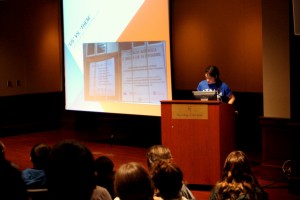By Jackie Kraus
Correspondent

Too often, Americans take for granted the status they have as official citizens of the U.S. Other parts of the world are not as fortunate. Take Italy as an example, where a good number of its residents are not accepted in the eyes of the government as “official Italians.”
Mary Jane Dempsey, senior international studies and history major, presented these ideas at a Student Spotlight presentation Tuesday, Oct. 16.
Though originally unsure of how to go about it, Dempsey knew that she wanted to work on a social justice topic that had to do with Italy. It was through some research and assistance from Italian professor, Simona Wright, that she discovered the “right by blood” issue, and therefore worked with Wright on putting together a study program. Dempsey was able to study abroad in Bologna, Italy for six months this past year.
Unlike America, the “jus sanguinis” (“right by blood”) proclaims that you are a true Italian if your parents are citizens, regardless of whether you were born there or not. Dempsey herself was born in Italy due to her father’s military stationing, but only found out recently about her lack of citizenship.
She offered well-known examples to help the audience visualize how backward this idea seemed. Singer Frank Sinatra was assumed to be completely Italian, though the man did not even speak the language. On the other side, Mario Balotelli, an Italian soccer player who plays as a striker for Manchester City and the Italy national team, is a positive asset for the team and a source of pride for Italy. Yet Balotelli, who was born in Sicily, did not gain citizenship until he was eighteen due to his Ghanaian parents.
These unrecognized Italians are often referred to as the “other.” Dempsey discussed the complex of “us” versus “them,” and the idea of being a “pure” Italian. Her argument was that if a man such as Balotelli can be so prominent and helpful for his country, how could he not have been born a true Italian?
Similarly, two Italian-born 19-year-olds with Bosnian parents were sent to a center for deportation and identification to prove their citizenship year after year. In one anecdote, Dempsey shared a picture of a young Italian boy socializing with a man without recognized citizenship. Others described the scene as the little boy with the “other,” to which Dempsey replied, “It just looks like two people being happy to me.”

Regarding those Dempsey was able to interview, Wright asked, “So what does it feel like to be ‘nobody?’” Dempsey was able to recall a Filipino boy born in Italy who still feels Italian regardless of what the government tells him. He said, “What am I supposed to feel if I’m not Italian?” She also worked in a soup kitchen with a Pakistani man who had the opposite outlook, of anger and disappointment. He had hopes of moving to Germany one day for a better life where he could be seen as a true part of the country.
“It’s surprising to me that some Italians can’t even gain citizenship by being born there whereas you can come to America at any point in your life and become a citizen,” said Rebecca Alterman, freshman business management major.
Dempsey repeated to those in attendance how important it was for we as Americans to recognize what we have in terms of belonging.
“I think it’s important to appreciate our civil rights and use your language skills,” Dempsey said. “I really encourage you to pursue it with a passion.”






